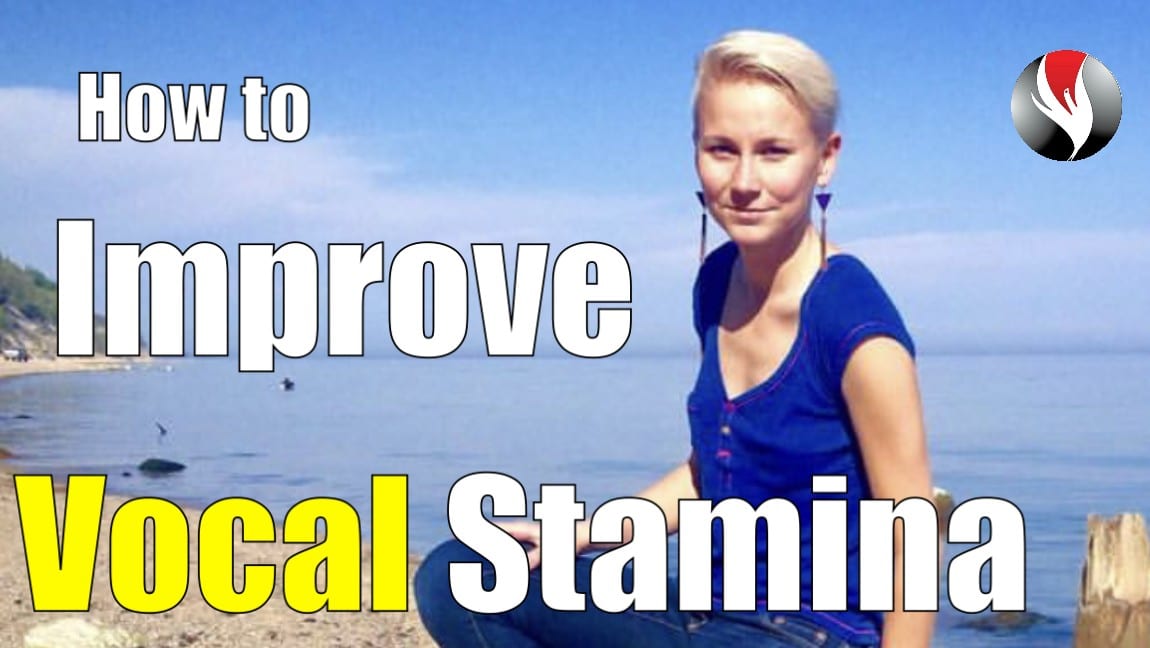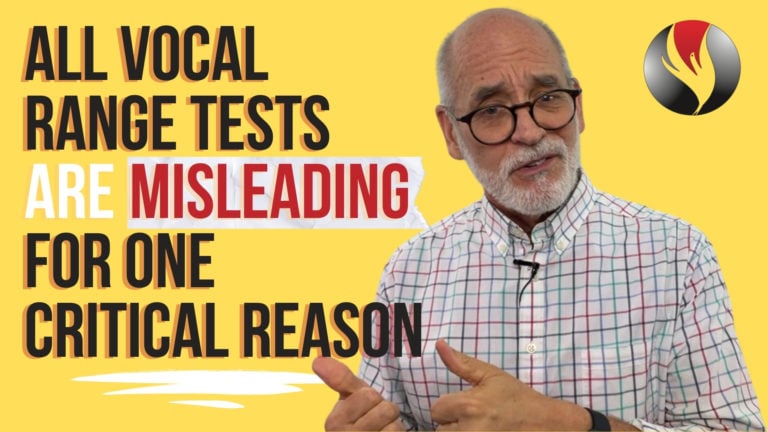This video is about how to improve vocal stamina. Featured is Margo Messinger. After years of hard work and preparation, Margo and her husband, Brian, just began a six month stint as a music duo performing on a cruise line in the Caribbean.
Hi, I’m Chuck Gilmore, International Vocal Coach and Founder of Power To Sing.
Each week I teach you lessons in vocal technique so you can build a powerful and confident singing voice. If you haven’t subscribed yet, please subscribe to my channel, Power To Sing. Be sure to click on the bell so you’re notified when I post special videos for you each week!
Margo was born in Russia and met her future husband while both were performing on a cruise line. Brian’s specialty is guitar and Margo’s vocals.
I’ve had the good fortune of working with Margo periodically over the last few years. She has graciously consented to share some challenges she’s experienced with her voice.
This video contains portions of an interview with Margo and brief excerpts from two of her lessons. Listen carefully as she shares real life difficulties she and many other professionals experience with their singing voices.
Margo’s a consummate professional and is intimately aware of her voice. Her experience will give you hope and direction to improve your own vocal stamina and the health and quality of your singing voice.
Near the end of this video, Margo references taking a vocal test and getting her vocal type. I will include a link here and in the description below this video titled, “Get Your Vocal Type”. Download the free PDF so you can take the vocal test and get your vocal type.
Also, please visit Margo and Brian’s website, at MargoAndBrian.com. Check out their newly released album on their website and follow them on Facebook and Instagram. The links are in the description below.
Thank you Margo. Best wishes to you and Brian as you entertain thousands on your Carribean cruise.
I’m Chuck Gilmore with Power To Sing. You can sing higher with beauty, confidence and power.
Now, enjoy the video.
Let’s go back to when you were experiencing problems with your voice. It was a, it hurt, it actually hurt you to talk. What, what was happening when you tried to sing?
My range? My range was quite limited. It felt even more limited. My high notes, I couldn’t produce really clear high notes. It was kind of raspy,
What do you mean clear?
They were, they were raspy. My singing was raspy and scratchy. I just felt physical tension when I was singing.
And that worked, raspy worked in metal. But what you were… Didn’t it?
It did to the extent because you still, you still have music melody that you need to follow. And when I’m experiencing this hardship with my voice, I can’t really produce it. I can’t make this melody happen. So, but yeah, you can kind of push a little harder in metal.
It’s not a big deal if it’s like it scratches a little bit and it’s like, Oh, it just sounds artistic or whatever, you know, and you can kind of, it can fly… [inaudible]
But it wasn’t the right approach for sure. And then I was trying to explore, I was trying to find a teacher who, who will, you know, explain to me how I, how, how might you deal with it all? But I guess, I don’t know, maybe just maybe just me, but somehow it was… Old the information, pretty much.
Most of the information that I got before, you know, before I started exploring on my own, before I discovered your channel and started taking lessons with you, all the information was kind of, it didn’t work for me. It didn’t really solve the issue. It was just, I don’t know, like for instance, “engage diaphragm”, you know, I can engage diaphragm and I can make in this way, I can find a way to push a little bit harder, but it’s not solving the fact that I’m not even utilizing, you know, the 50% of my range, you know, in some registers.
So you were stuck down in the bottom?
I was stuck in my chest for sure. [inaudible]
And to sing higher, you just had to keep pulling, pulling the chest up high. [inaudible]
I had to push harder to sing higher.
Did you ever just like go into falsetto?
I did. I did. Especially I did when I was already on the cruise ship, so. Right. On the cruise ship, you’re supposed to sing three, four hours a day, no days off. I mean maybe one day off a month. Right. So it’s a big, it’s a big workout for your voice. And with my approach, with my push harder kind of approach to my voice, it worked to certain extent.
When… I’d remembered the first thing I noticed that I couldn’t produce my head voice notes at all anymore. That was the first sign for me. I couldn’t do head voice at all. It was just like whisper, just like air, just, it was not right. I still could push, but my head voice was gone.
What goes through your mind when that happens?
Oh, … Desperation. Desperation. Fear. Like, Oh my gosh, am I going to just like not be able to sing? What do I do? How can I change it?
Yeah. And if you’re, if you’re in the middle of your cruise with three to four hour a day commitment, that’s, that can be pretty stressful.
It was pretty stressful. I was, I was quite afraid. I was like, am I like, will I have to, you know, just leave. Will I have to just sign off the ship? Like what do I do?
But you know, I also feel like sometimes to get to, you know, to get further to like, you know, to move on to some next stage, you actually have to experience deep, low place from where you’re like, okay, I got to get out of there now. I’ve got to find a way to make it work.
So I know we haven’t really talked. We have, you and I haven’t even talked about this. Do you think we could, do you think we could do something right now vocally just to kind of show what you’re talking about? I’ll tell you what, you tell me. Where in your voice, what notes was a problem…. Did you notice it being kind of like a problem?
I think anything starting with A, ..what is it? A …. A4? Yeah. Anything. Starting A4. Which I would like in the past I would do a four in chest, no questions asked, you know, just I would, I would do like five. Yeah. C5 I would do chest, which would hurt and yeah. And now I’m discovering that I can do it, you know, in mix.
And this way it opens up just this further area that this, this way I can go higher. And it doesn’t sound weak. It doesn’t sound like full chest. It doesn’t have this like beefy quality in it, but it, but it sounds very pleasant and it feels pleasant. So
Let’s get this, let’s try this for a second. Let’s just do new new new
No, no, no.
That’s on the a4 and let’s go from a up to the C sharp5. Just doing the new, new, new, no, no, no. For a minute. Okay.
No, no, no.
New, no, no, no.
[Inaudible]
No, no, no, no, no, no, no, no, no.
[Inaudible]
New, no.
All right. Now, could you do the no in chest, so do the new, like you were doing, but do the no in chest so that you, maybe the way you used to do it.
New No.
New No no no no no.
Okay. I don’t want to ask you to do it anymore. I mean, I know you can do it, but I don’t, you know, I don’t want to get your, I don’t want to get your voice hoarse. You know, a lot of people who, when they hear both of those, they sometimes they really can’t hear the difference yet, you know, just, but their own experience. They’re not quite tuned in to the contrast. But what’s the difference for you?
All right. So when I do it the pushed way, this strained way, I feel how my muscles tense, how my, like my whole throat kind of just, yeah, just gets tight. It’s unpleasant. And I feel like the sound, even though me haven’t done it for years, and you know, I used to feel like it’s, you know, there’s beauty like, doing, this kind of sound right.
There was sort of vibe in the sound that is attractive for people, I guess. I don’t know, maybe people just love you know, hearing pain, but, but even though there was this element, it’s like, Oh, that’s like desirable sound, but it just doesn’t necessarily feel right because in this way I feel that I can, I just, there was this ceiling that I just get stuck in and I just can’t go higher.
And this way it’s like the huge part of my range is just not being utilized and I don’t feel like real freedom in my voice then when I do it the way you know, the way that you teach.
It’s more subtle, it’s more gentle just in the way I produce it. If I, I think I’ve learned that it doesn’t even necessarily sound more gentle, you know, it can get quite strong, but the way it’s produced, it’s just more like crafty, so to say. It’s like not as, not as, I dunno, like if we compare an ax and, and this like … Surgical knife.
Good point. And here’s the great thing about this. The more you work in that area of your voice, the more you’re working that mix, And the more you’re practicing the mix, the stronger it gets. And so people really can’t tell a difference and it’s still very, very vibrant, very strong and very loud and and you’re preserving your voice too. So, okay.
Well even, even, even with my what was the word relatively, even in my relatively short period of working on vocal technique and I still have a lot to do, but I already feel during our gigs how it, how it works, how it makes me feel, how it engages other people too. That listen to me. It’s, it’s something, it’s something else for sure.
I feel like you’re doing really well. And that it’s coming along really nicely. I mean, this is, this is not a beginner’s mix. What you’re doing. Yeah. I mean w how, what, how do you feel about it?
I think it’s a work in process. Yeah. You know, I, I feel like I, I started working on mixed relatively recently. Like only like, you know, I discovered that, Oh wow. I have head voice like maybe three years ago or four years, three years ago probably like, Whoa, there was a head voice and I can like train it to you know, it really depends.
Like sometimes when I find this place, it just feels so good. It just feels so easy, effortless. And I can navigate whether I want to make it softer or harder. And sometimes it just so frustrating because I can’t find this place and all I can do is just this breathy head voice, which doesn’t really mix with my chest. And so I guess it’s just a work in process.
Sure. Do this for me and say, I want you to do a kind of funny
Ney . Ney Ney Ney Ney
Ney
Stay exaggerated. [inaudible]
Ney….
One more
Ney…..
[Inaudible] [inaudible]
Ney ney Mmm. [inaudible]
Ney Ney……
No, no, no, no, no, no.
[Inaudible]
No, no, no, no, no, no.
[Inaudible]
No, no, no, no, no, no, no, no, no,
No,
No, no, no, no, no, no, no.
Keep it going.
No, no, no, no, no, no, no, no, no,
No,
No, no, no, no, no, no.
[Inaudible]
No, no, no, no, no, no.
[Inaudible]
No, no, no,
No, no, no,
No, no, no, no, no, no,
No, no, no,
No, no, no, no, no, no, no,
No, no, no,
No, no, no, no, no, no, no, no, no, no.
Way to go.
It feels today it feels actually pretty good. I’m just trying to understand what it depends on really. You know, sometimes it’s just easy to find, sometimes not as easy, but it feels that I can control dynamics and strength and I am not straining.
I just can control it by, I don’t know, like maybe a little bit narrowing the sound or engaging the diaphragm and maybe just pressing a little bit more air. But it’s not straining. It’s not external muscle tension.
Yeah. So it’s called it’s friendly compression. Friendly compression. Friendly compression. Yeah. Cause you’re, you’re leading the, that air is leaning against the courts, but it’s not a straining kind of thing where you’re grabbing it and so forth. So
[Inaudible]
Way to go.
[Inaudible]
Oh Mmm.
Good, good. Yeah. Way to go now. I didn’t hear it that time. So were you thinking… What were you thinking?
I was thinking vertical and I was thinking… Friendly compression. Mm. And that was thinking open my opening mouth vertically. So yeah, that’s, yeah. Felt good. Felt pleasant.
Are you feeling about your voice right now?
Right now, I feel like this new way of producing the sound that I’m discovering with your help Chuck as well. It just, it just liberates me to do more things. It’s, it just allows me to have more vocal freedom and better endurance for sure. Because in the past, after, after a gig when I was pulling my chest voice for three hours, I would feel devastated.
Now sometimes I, after three hour gig, I’m like, Oh my gosh, I feel great. I want to keep doing this forever! I feel a few limitless, you know? So it gives, it totally gives lots of freedom. It has some challenges in it. More of like probably psychological challenges because because of this commercial sound that is presented widely everywhere nowadays is not exactly healthy.
It’s not correct, but people kind of want you to sound this way and people kind of expect you to sound this way and, and they take it as strong voice, as powerful voice, is, I don’t know, talent, whatever else people call it, but it’s not healthy.
And that’s a challenge that I have to face with myself too. I tell myself, okay, I need to, to approach my voice with care and the right technique and I want my voice to work for all my life.
I want to be able to sing freely, no matter how high or low it is. I don’t want to strain. So it’s, it’s a challenge, but it’s a rewarding challenge.
Um I’ve, just out of curiosity, how, what, how did you and I connect in the first place? How did you find out about me? What were you doing?
I think I was just, well I began with I began discovering vocal techniques with Brett Manning’s CDs, you probably know Brett Manning? That was my, you know, first thing. And then I just, I just found you on YouTube. I don’t know.
It was just randomly, I just found Power To Sing, Chuck Gilmore, and I just started watching videos and it made lots of sense. And then I started watching your live videos and at some point I’m like, Oh, I can, I can actually get a lesson. That sounds pretty cool.
Did you ever try, try vocalizing on your own with the video or you know, with the live broadcast?
Yeah, I absolutely do. I downloaded your exercises from your website, you know, for pulled chest. Actually, I think I submitted my a vocal type test and you responded to me and that was actually so impressed. Like, wow, there’s a human being there, you know, they’re like, you actually recorded like “Hi Margarita, It’s.. (You know,)… it’s Chuck. Your type is pulled chest – high larynx“.
I’m like, Whoa, that’s cool. So yeah, I just practiced with your with your exercises it that you posted on your website. And now is, as we did a few lessons, I just play them and they sing over them, try to do it every day.
And I’m glad that, I’m glad to hear that and that, that makes me happy. So. Okay.
Awesome. Thank you so much for your help and for all the useful information and skills that you are sharing. It’s, it’s really precious for me to get to study with you and yeah, I mean, I’m sure we’ll see each other again. I just didn’t know when. So for now, yeah. For now it’s been awesome.
Well the feeling is mutual….
[Inaudible] [inaudible] [inaudible] [inaudible]
[Inaudible].
Margo and Brian:
Our website: https://www.margoandbrian.com/
Spotify: https://open.spotify.com/album/3j6vrwGfTDY3WJkAUlp95E?si=6ZTp4C6FTM2mm3Glph58TA
Apple Music: https://music.apple.com/us/artist/margo-brian/1472586771
Google Play: https://play.google.com/store/music/album?id=Bu4jthbu2n226l6n4otykl7r3z4
Margo and Brian Social:
Instagram: https://www.instagram.com/margoandbrian/
Facebook: https://www.facebook.com/margoandbrian
YouTube: https://www.youtube.com/playlist?list=PLlOB0K1US-cqUe9mPXSJptbrHa6t0qoXq








Responses